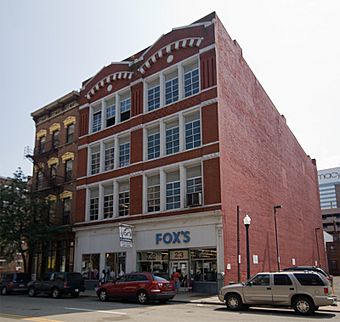Alkemeyer Commercial Buildings facts for kids
Quick facts for kids |
|
|
Alkemeyer Commercial Buildings
|
|

Front and western side of the buildings
|
|
| Location | 19-23 W. Court St., Cincinnati, Ohio |
|---|---|
| Area | 0.2 acres (0.081 ha) |
| Built | 1879 |
| Architect | William Walter |
| Architectural style | Italianate, Queen Anne |
| NRHP reference No. | 80003034 |
| Added to NRHP | December 9, 1980 |
The Alkemeyer Commercial Buildings are two historic business buildings. You can find them at 19 and 23 Court Street in downtown Cincinnati, Ohio, United States.
Contents
Discover the Alkemeyer Buildings: History and Design
These interesting buildings have a rich past. They show off two different styles of architecture.
What are the Alkemeyer Buildings?
Built in 1879, these two buildings are quite tall. They each have four stories and are made of brick. They stand out along Court Street, especially near Vine Street. Over the years, these buildings have been used for many things. They once housed shops selling clothing and dry goods (like fabrics and small household items). They were also used for making hats and even as apartments where people lived.
The Lotze Building: Italianate Style
One of the buildings, at 19 Court Street, is called the Lotze Building. It was designed by a famous architect named William Walter. He created it for the family of an inventor named Adolphus Lotze. This building was constructed between 1879 and 1880. It shows off the Italianate style. This style often has tall, narrow windows and decorative details. Today, the Lotze Building is used for homes.
The Queen Anne Style Building
Right next to the Lotze Building, at 23 Court Street, is a larger building. This one is built in the Queen Anne style. This style often includes different textures and shapes. It might have towers, turrets, or patterned brickwork.
Why are the Alkemeyer Buildings Important?
In 1980, both Alkemeyer Buildings were added to the National Register of Historic Places. This is a special list of places in the United States that are important to history. They were recognized because of their role in local history. Their unique and important architecture also made them stand out. They were officially listed on December 9, 1980.
See also
 In Spanish: Alkemeyer Commercial Buildings para niños
In Spanish: Alkemeyer Commercial Buildings para niños


